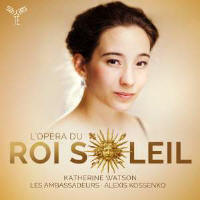Texte paru dans: / Appeared in: |
|
|
Outil de traduction ~ (Très approximatif) |
|
|
Reviewer: Bertil
van Boer Here we have a recital disc by soprano Katherine Watson, whose initial foray into the field of French opera of the ancien régime takes in a compendium of works excerpted from operas by most of the composers active at the court of Louis XIV. The theme, as is noted in the essay entitled “Operatic Tears,” is to “illustrate the art d’attendrir,” or expression of the emotion of tenderness. Of course, there is no lack of attention to emotion in the works of Jean-Baptiste Lully, Marin Marais, André Campra, and others, which is something that their librettists strove for in the language of the texts and which the composers outlined in musical styles. Today, however, our sensibilities have changed considerably; no longer are we moved to tears or expressions of gripping emotion by such arias, but rather we tend to regard these as elements of sentimentality. Still, one needs to know the style, given that groups like Les Ambassadeurs and the Ensemble Pygmalion, to name two, aspire to recreate in our world of period practice. Not surprisingly, there seems to have been a rather steady stream of revivals of complete operas, thanks to institutions like the Centre de musique du baroque de Versailles, and this recital or concert disc might be a good way to introduce new talent who can master the intricacies of the style, including the plethora of discrete ornamentations, helping them on the road to help reviving this music.
The arias and instrumental
pieces are all fairly uniform. For example, the Marais Air for the flutes is
gentle and fluid, while the Campra Chaconne is a stylized dance with some
central variations in the form that are more vivacious. Henri Desmarest’s
invocation to the river gods of Hades runs the course of each of the three
rivers, while Circé’s appeal is punctuated by a rapid-fire string ritornello.
Jean-Baptiste Stuck’s aria from Thetis has a sort of Handelian trumpet
obligato, and obligato oboe that double in the various melismatic passages.
Of course, it is all about the warrior in this aria, but the gait of the
music is rather more rapid than stentorian. And so it goes. The performance here by the Ambassadeurs is done well. Here we have a lively group whose tempos from graceful to swift are nicely regulated by Alexis Kossenko. The group is in tune, providing a fine background for the flexible voice of soprano Watson. The music is a good cross-section of works from the era, and blending the vocal numbers with instrumental movements, something quite common to the opera of this period, is a good idea for variety. Though there are variations in mood and content, there is a certain sameness to the music. One truly needs the visual effects for a full appreciation, but if one is new to the music of turn-of-the-century Baroque France, this disc will give a fine introduction. Here’s to more focused complete works by these composers, all of which will no doubt be extremely efficiently and stylistically performed by Watson and crew.
| |
|
|
|
|
Cliquez l'un ou l'autre
bouton pour découvrir bien d'autres critiques de CD |
|




